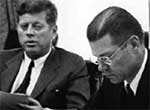Notion of 'strike first' helped fill the 20th century with violence
Published in the Los Angeles Times, December 19th, 2003
In the spring of 2001, I started interviewing Robert McNamara, the Secretary of Defense under Presidents Kennedy and Johnson, for the film The Fog of War. I have often been asked: "Why McNamara? Why make a movie about this man, a man reviled by many as the architect of the Vietnam War?" Because I had read McNamara's book, In Retrospect, in 1995 and was surprised that the book I read was different from the mea culpa that was described in countless reviews and editorials.
The book wasn't an apology but an anguished attempt to look back on history and to imagine whether history could have been different. At its heart, it also raised these questions: "Can we learn from experience? Can we learn from history?"
McNamara's earliest memory is of Armistice Day, 1918. "I was two years old," McNamara says in the film, "You may not believe I have the memory but I do. I remember the tops of the streetcars being crowded with human beings cheering and kissing and screaming. End of World War I — we won. But also celebrating the belief of many Americans, particularly Woodrow Wilson, we'd fought a war to end all wars."
What I find so interesting about this memory is that it is a memory of "preventive war." This becomes one of the central ironies of the film. The war that was fought to end war ushered in the 20th century, the century of the worst carnage in human history. Far from ending future war, World War I engendered war.
Now that the concept of "preventive war" has entered the vocabulary again in the context of the latest Iraq War, it is interesting to note that it is has been a recurring theme through the last century.
In the late 40's and early 50's preventive war was seriously discussed because of the advent of nuclear weapons. It was argued that since the U.S. had nuclear superiority, we would be well advised to fight the Soviets sooner rather than later, before they can match our nuclear arsenal.
One of the advocates of this policy was Curtis LeMay, the Air Force general whom McNamara served under during World War II. In 1957, LeMay was head of the Strategic Air Command. He was warned that few SAC bombers could survive a surprise Soviet attack, and the men who told him the news remember his response: "I'll knock [them out] before they get off the ground...It's not national policy, but it's my policy."
And it was LeMay who essentially advocated preventive war during the 1962 Cuban Missile Crisis.
Everyone is familiar with tape recordings Nixon made in the White House, but it's less well known that both Kennedy and Johnson selectively recorded phone conversations and cabinet meetings. In one recording made during the missile crisis, LeMay (by then Air Force Chief of Staff) comes across as angry and bellicose. He tells Kennedy that what Kennedy is doing — foregoing immediate military action in hopes of negotiating a settlement — is worse than Munich; that is, worse than the way British Prime Minister Neville Chamberlain gave into Hitler and set up World War II. Essentially, LeMay calls Kennedy an appeaser, a weakling. And LeMay never backed down. In a story McNamara tells after the Cuban missile crisis is resolved, Kennedy compliments his generals on having "won" by keeping the nation out of war. LeMay blurts out, "Won, hell, we lost. We should go in and wipe them out today!"
Such stories are particularly instructive because of new information that has come to light in recent years. In 1962, the CIA had told Kennedy and his advisors that there were no nuclear warheads in Cuba. They were wrong. In fact, there were 162 nuclear warheads on the island that could have been used against an American invasion force and the U.S homeland.
LeMay's belief that it was important to strike then - to fight a preventive war when the odds were supposedly with us - would have in all likelihood led to disaster. It would have led to a nuclear exchange between the U.S. and Soviet Union. Someone recently said to me, "Well, the Cuban Missile Crisis was not that important." I replied, "It depends on how important you think Florida is."
So here we are, at the beginning of a new century, and preventive war has made a comeback. I look at it with a jaundiced eye. Haven't we been there before? Isn't "preventive war" an oxymoron? Shouldn't we have learned by now that war doesn't reduce hostility, angry, and instability, but creates more of the same? And we might ask ourselves in turn: do we want more of the same for this next century?
Ounce Of Preventive War, Pound Of Destruction
EDITORIAL
Not Every Picture Tells a Story
Where's the Rest of Him?
There Is Such a Thing as Truth
RELATED FILM
The Fog of War







